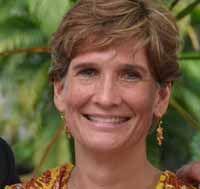On 25 July, news of the death from Ebola of one Liberian man in a private clinic in Lagos sent shockwaves through the country. The Liberian had withheld from the medical staff the fact that he had been in contact with Ebola sufferers in Liberia. As a result, several medical staff were contaminated, the hospital shut down and an isolation centre opened.
For Nigerians, the horror stories of devastation in Guinea, Liberia and Sierra Leone were terrifying. Though Lagosians are more educated and the health services better developed than in the other countries, the potential devastation to the city’s 21 million, tightly packed residents was very real.For expats, the news came as parents were preparing to return to Lagos for the start of the school year. The American International School of Lagos (AISL) was due to open on 13 August. It delayed its opening until 25 August, closer to the date that other private Nigerian and international schools were due to open.
Though the risk of coming into contact with the Ebola virus was estimated to be extremely low for Lagosians in general and for expats in particular, the future looked decidedly uncertain. How long would the outbreak last? Was there a risk that children would loose enough days from school to threaten their academic year? How accurate were risk estimates anyway?
The regular bulletins coming out of the Ministry of Health indicated that the contagion was limited to individuals who had had direct contact with the Liberian. However, expats in Nigeria tend to rely on the information provided by international news providers and each other (the rumour mill) rather than that provided by local authorities. This suspicion is not all together unwarranted given the state of news reporting here. A journalist for Agence France-Press (AFP) admits that the most difficult part of his job here is to get firm confirmation of any facts. In the case of this outbreak, it is imaginable that the government would feel pressured to keep the truth from the general public. In this case, however, it appears that Nigerian authorities and officials from the World Health Organisation did a good job of providing accurate and up-to-date information.
International schools, basing their decisions on details provided by ISOS, a private, foreign-run health clinic, and the well-connected multinationals, opened as planned on the 25th. The next day, however, on the afternoon of 26 August, the Lagos state authorities came to inform the school that they would need to shut until 13 October. The reason given for the closure was the need for time to prepare staff and teachers on the requirements of health and safety for the kids in schools. The international and French schools appealed, showing authorities the extensive protocols already put in place. To no avail. At the end of the school day on 27 August, schools closed their doors until further notice.
Though the school grounds were off-limits, teaching at AISL never stopped. Teachers switched to age-appropriate online methodologies, relying on parents for supervision. The middle school was able to take advantage of Google Classroom, a programme that had opened days earlier. IB students were able to meet at other locations with peers and supervisors in tutor groups and small study sessions.
Obviously this learning situation is not ideal – not for parents, students or teachers. But it showed the flexibility and resourcefulness of the international school. And by 8 September the government was confident enough that the virus was contained to allow schools to open on September 25.
As of 30 September, school has resumed and Nigeria has been declared free of any live cases (though can be declared officially Nigeria will be declared ‘Ebola free’ if there are no more cases after two incubation periods from the last confirmed case which will be Oct 20). The risk to individuals did indeed turn out to be extremely low and the outbreak short-lived.
However, at some point in the two-month saga, some partners and children decided not to return. In the end, how you evaluate risk, and what is good or right for any given family is deeply personal. Clearly, with today’s porous boarders, anyone could enter the country at any time and start a new wave of infection. For those of us who stayed, life goes on largely as usual. Public education campaigns were effective in changing some habits: people stopped shaking hands, even in churches, and everyone uses copious quantities of hand sanitizer. However, there is an African film festival, the opening of two art exhibits and a book reading this weekend. The energy of the Lagos spirit remains unconquered.
Diane Lemieux was born in Quebec, Canada and began travelling at the age of three. She has lived in ten countries on five continents and speaks English, French, Dutch and Portuguese. She has a BA in communications, an MA in development studies, a post-MA in International Relations and a journalism diploma. She has ten years experience in international development and fifteen years as a freelance author and journalist. She is the author of four books including the award winning The Mobile Life: a new approach to moving anywhere and Culture Smart! Nigeria.
See her blog: diane-lemieux.com/mobilelife and her active Facebook page on mobility

